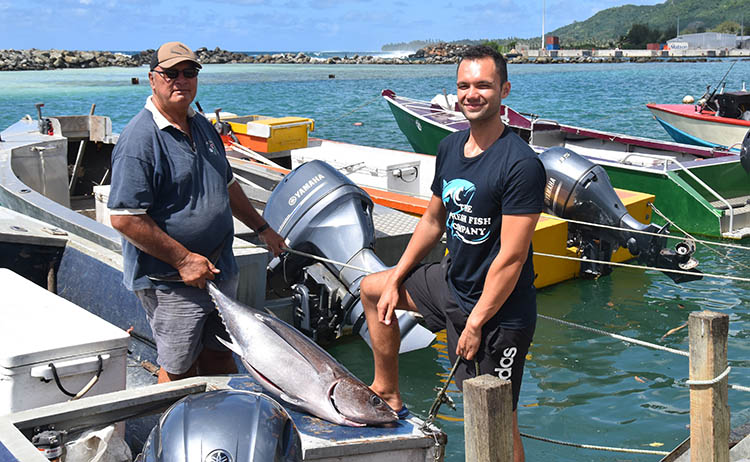Fishermen, environment group seek solutions to dwindling fish stocks
Saturday 2 December 2023 | Written by Rashneel Kumar | Published in Environment, Local, National

Fresh Fish Company’s Timothy Vaikai purchasing fish from fisherman Fred Thompson. 21040105
Dwindling fish numbers and the potential impact of deep sea mining on fish are among the issues in Cook Islands waters that fishermen and an environmental group want to see addressed at an upcoming meeting in Rarotonga between the Pacific’s fisheries ministries.
As the Cook Islands prepares to host the annual meeting of the Western and Central Pacific Fisheries Commission (WCPFC) from December 3 to 8, the country’s fishermen and Te Ipukarea Society weighed in about the issues impacting the fishing industry.
Fresh Fish Company owner Timothy Vaikai – whose business collaborates with about 12 part-time fishermen from Rarotonga, Aitutaki, and Palmerston – said a major challenge facing the industry was the inconsistent supply of fish.
“Traditional patterns of catching specific species during certain seasons have become less reliable, leading to increased unpredictability,” Vaikai said.
“Many of our local fishermen have their ideas of how to solve this.
“Some believe the deployments of more FADs will help attract fish to our shores. Others feel the presence of international fishery vessels around our country’s borders doesn’t help. Some view the changes as normal seasonal variations.”
Prime Pacific Seafoods owner Matai Price said he imports 2.8 tonnes of fish from Hawaii, Mexico, New Zealand, South Africa, and Tahiti each week to keep up with demand in Rarotonga.
“Two million square kilometres of water, and I’m importing fish. It’s a real shame that I do it, but there’s no fish around and people need to eat.”
Price, who used to be a commercial fisherman, said the main reason the Cook Islands’ fish stocks were depleting was because technology for fishing was “everywhere in our waters and the fish have been attracted to it”.
“The new technology is so sophisticated, it will tell you exactly what is in the water. It’s mindblowing.”
While Price had been selling fish by word-of-mouth for about a year, plans were in motion to open a shop opposite Castaway Resort in Arorangi this month.
“My fish is available to everybody,” he said.
“I actually started importing fish before Covid, but Covid shut me down – so there was always a market.”
Vaikai said the Fresh Fish Company was “neutral” about how best to solve the issue of the dwindling supply of fish, because there was a lack of scientific data to support a specific resolution.
Vaikai was looking forward to seeing what actions the WCPFC would take to mitigate the issue, and help Cook Islands fishermen get “access to their own fish”.
“We trust that decisions made by those with greater authority and knowledge will lead to the right solutions.”
Vaikai said the WCPFC would be touching on the “sustainability and assessment of migratory fish in our waters”, an issue important to fishermen in the country.
“Our business was founded on the principle of supporting local fishermen and providing fresh fish to our community. Despite challenges in achieving consistent supply, we believe that collaboration among local stakeholders, government, and organisations like the WCPFC can help us achieve our
goals.”
Te Ipukarea Society technical advisor Kelvin Passfield said the non-government organisation (NGO) had been approved as an observer of the meeting.
The goal of attending was to gain a “greater knowledge” of how the yellowfin, albacore, bigeye, and skipjack tuna fisheries were being managed and how the stocks were faring.
“We would be interested to know why the fish catches have been so low around the southern Cook Islands, and whether industrial fleets are having an impact on local catch rates for local fishermen,” Passfield said.
“One of the things we would like to see discussed is the potential impact of deep sea mining on fish stocks. We also remain concerned about the drifting FADs (Fish Aggregating Devices) used in purse seine fishery.”
The society was also looking forward to an update on progress on a Green Climate Fund project being developed to address the impact of climate change on tuna.
Passfield said it was “great” the WCPFC20 was coming to Rarotonga, as the society could “never afford” to travel to attend a meeting in another Pacific country.
“It’s nice to be at the table, I just wish there was some fish on that table,” he said.
“It will help us in designing smaller projects that we can undertake as a small NGO.
“It puts us in a better position to report back to our members, who often raise concerns about the fisheries.”
Passfield said the society wanted to see the number of FADS, which are nets anchored to the ocean floor to attract fish, in Cook Islands waters reduced – as well as for the remaining devices to be biodegradable, rather than made from plastic and synthetic netting.
He said the society had previously raised concerns about deep sea mining to the Marae Moana technical advisory group – who had acknowledged it as a “watching brief” – and the “stress” of noise pollution, sediment pollution, and trans-boundary effects the industry could have on fish populations.
“I could be enough to push the stress over a threshold.”
Fish were already impacted by climate change, industrial fishing, plastic, and the general health of the ocean, Passfield said.
The WCPFC manages highly migratory species such as tuna and tuna-like species in the western and central Pacific Ocean (WCPO). WCPFC20 will attract between 550-600 participants, including delegations from Asia, Europe, and the Americas and across the Pacific.














































